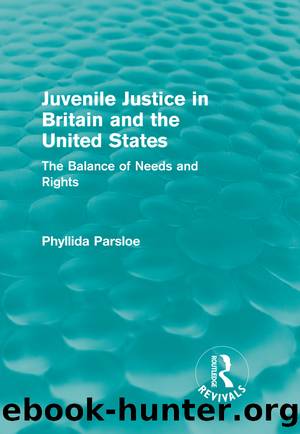Juvenile Justice in Britain and the United States by Phyllida Parsloe

Author:Phyllida Parsloe [Parsloe, Phyllida]
Language: eng
Format: epub
Tags: Social Science, Sociology, General
ISBN: 9781351561464
Google: Ly8rDwAAQBAJ
Barnesnoble:
Goodreads: 3700531
Publisher: Routledge
Published: 1978-01-01T00:00:00+00:00
DEVELOPMENTS SINCE 1969
There is a great deal of criticism of the juvenile justice system in England and Wales from those holding a welfare approach as well as from those who are closer to a criminal justice approach. Some writers trace the problems to the piecemeal way in which the Act has been brought into force.(47) What was intended as a way of providing help for troubled and troublesome youngsters, has lost its clear philosophy and is now a jumble of contradictory approaches which pleases no one. Berlin and Wansell(48) suggest that social workers saw the Act as giving support to the idea that offenders need help, not punishment, and as curtailing the power of the magistrates to make detailed decisions about the treatment of children. Such decisions, according to social workers, should be made by those professionally trained to understand the special needs of troubled children. The Act, as it has turned out, is not based fully upon a welfare approach, and has left the magistrate power to make what social workers regard as punitive orders.
The magistrates, on the other hand, see the Act as giving too much power to the executive. One magistrate, when he resigned, wrote in a letter to âThe Timesâ that âthe impartial judiciary had been devalued in favour of the executiveâ. Magistrates say they sign what amounts to a blank cheque(49) when they make a care order. Even their clear intention that the subject of the order should no longer live at home may be ignored, since the social service department can place a child back home immediately. This probably does not happen often, but it has considerable impact when it does occur, since it is taken to illustrate the divergence between the sentencing philosophy of the courts and the thinking of child care specialists. The magistrates feel powerless to carry out their duty to protect the public.
A note from the Magistrates Association to the House of Commons Expenditure Committeeâs Social Services Sub-Committee on 13 December 1974, outlined the areas in which the magistrates experienced particular difficulty. In summing up their recommendations the Secretary stated:(50)
Fines should be made enforceable. The Juvenile Court should have power to remand âin custodyâ when the local authority should have a duty to provide secure accommodation. In making a care order the court should have power to require that the juvenile be sent to an institution. More institutions should be available, and some reclaimed that were lost when approved schools were ended. In particular, more secure accommodation should be provided there. Supervision orders should permit the court to impose conditions and sanctions for breach. In short, the law should be tightened up to provide effective powers and facilities for dealing with the minority of persistent juvenile offenders.
Download
This site does not store any files on its server. We only index and link to content provided by other sites. Please contact the content providers to delete copyright contents if any and email us, we'll remove relevant links or contents immediately.
Crime and Punishment in Contemporary Culture by Claire Grant(174)
Digital Evidence in the Courtroom by John D. Nilsson(157)
Encyclopedia of Murder and Violent Crime by Eric W. Hickey(150)
Juvenile Justice in Britain and the United States by Phyllida Parsloe(150)
The Historical and Institutional Context of Roman Law by George Mousourakis(143)
Prisoner Voices from Death Row by Reena Mary George(142)
Blackstone's Police Operational Handbook 2014: Law by Police National Legal Database (PNLD) & Ian Bridges & Fraser Sampson(141)
European States and Their Muslim Citizens : The Impact of Institutions on Perceptions and Boundaries by John R. Bowen; Christophe Bertossi; Jan Willem Duyvendak; Mona Lena Krook(141)
Organized Crime in the U.S. by Wesley B. Knowles(139)
Transforming Summary Justice by Jenni Ward(136)
Innovative Justice by Hannah Graham Rob White(135)
Contemporary Issues Facing the International Criminal Court by Richard H. Steinberg(121)
International Criminal Investigations : Law and Practice by Adejoke Babington-Ashaye; Aimee Comrie; Akingbolahan Adeniran(120)
European Court of Justice Legal Reasoning in Context by Suvi Sankari(119)
Prosecuting the Destruction of Cultural Property in International Criminal Law : With a Case Study on the Khmer Rouge's Destruction of Cambodia's Heritage by Caroline Ehlert(117)
Mass Marketing and Consumer Fraud: Background, Issues and Data : Background, Issues and Data by Martin A. Parham(113)
Sexual Harassment around the Globe by Katherine C. Wong(112)
Research Handbook on International Marine Environmental Law by Rosemary Rayfuse;Aline Jaeckel;Natalie Klein;(103)
Law for Criminologists : A Practical Guide by Ursula Smartt(101)
